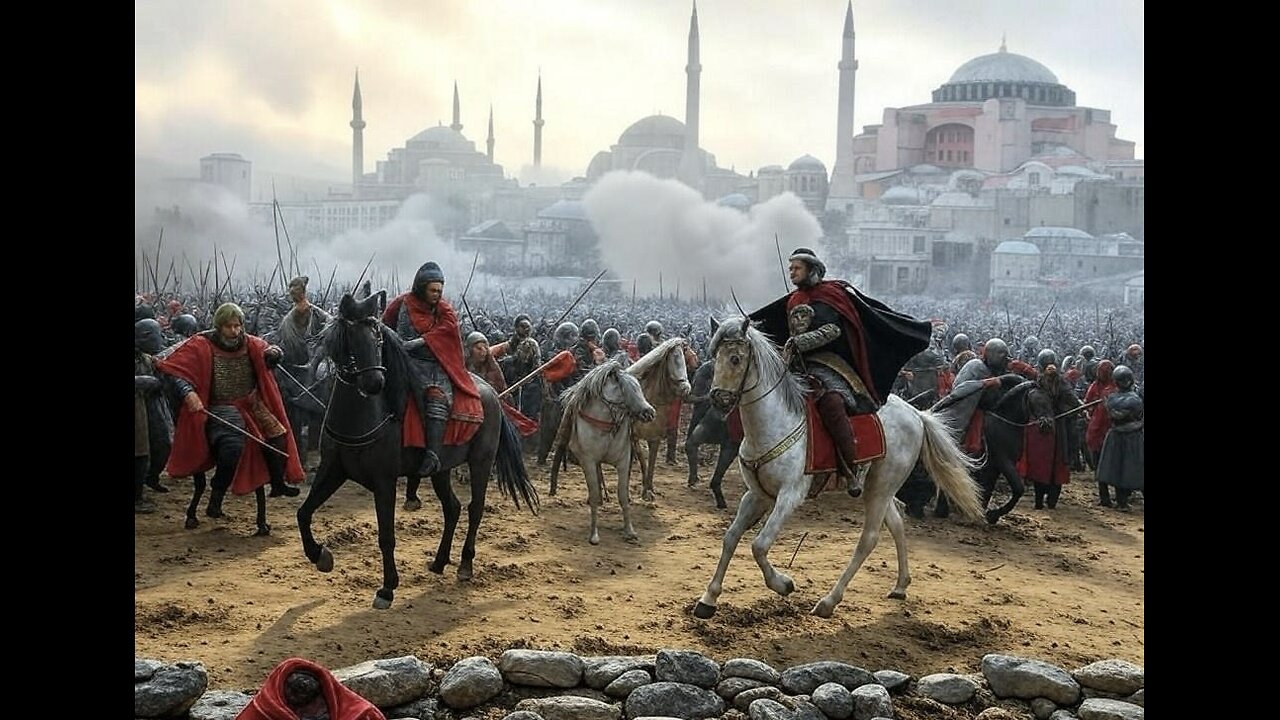Premium Only Content

The fall of Constantinople
The fall of Constantinople, which occurred on May 29, 1453, was a pivotal event marking the end of the Byzantine Empire and the rise of the Ottoman Empire as a major power in Europe and the Near East. Here's a concise description of the event:
The Fall of Constantinople (1453):
- Background: Constantinople, once the grand capital of the Eastern Roman (Byzantine) Empire, had been in decline for centuries due to internal strife, economic troubles, and repeated sieges by various powers. By 1453, it was a shadow of its former glory, with a significantly reduced population and weakened defenses.
- The Siege: The Ottoman Sultan Mehmed II, known as "Mehmed the Conqueror," launched a massive siege on Constantinople. His army, equipped with new technology like large cannons, including the famous "Basilica" cannon, besieged the city. The siege lasted for nearly two months, with several unsuccessful attempts to breach the walls until the final assault.
- The Attack: On the morning of May 29, 1453, after intense bombardment, Ottoman forces managed to breach the walls near the Gate of St. Romanus. Despite fierce resistance, the city's defenders, led by Emperor Constantine XI, were overwhelmed by the sheer numbers and strategic prowess of the Ottoman troops.
- The Capture: Constantine XI died during the battle, and Constantinople fell to the Ottomans. The event is often remembered for the brutal sack of the city that followed, although Mehmed II quickly moved to restore order, converting the Hagia Sophia into a mosque and repopulating the city to reestablish it as the Ottoman capital.
- Consequences:
- Political: The fall of Constantinople ended the Byzantine Empire, which had lasted over 1,000 years. It cemented Ottoman control over the eastern Mediterranean and established Istanbul (renamed from Constantinople) as a major cultural and political center.
- Religious: The event marked a significant shift in the religious landscape, with Islam becoming more dominant in the region. The conversion of Hagia Sophia symbolized this change.
- Cultural: The influx of Greek scholars to the West before and after the fall contributed to the Renaissance, bringing with them ancient texts and knowledge.
- Legacy: This event has been seen through various lenses over time - as a tragic loss for Christendom by some, a glorious conquest by others, and universally as a turning point in world history.
The fall of Constantinople is not just a military event but a profound cultural and historical shift, influencing the course of European, Middle Eastern, and global history.
-
 LIVE
LIVE
LFA TV
1 day agoLIVE & BREAKING NEWS! | MONDAY 10/6/25
712 watching -
 1:08:56
1:08:56
MTNTOUGH Podcast w/ Dustin Diefenderfer
11 hours agoJoby Martin: Calling Men to Biblical Manhood | MTNPOD #136
3.75K1 -
 LIVE
LIVE
LIVE WITH CHRIS'WORLD
5 hours agoLIVE WITH CHRIS’WORLD - Portland is a WARZONE | Chicago | Jay Jones | Bad Bunny | ANTIFA | and MORE!
177 watching -
 1:02:29
1:02:29
BonginoReport
4 hours agoIs Your Sombrero Getting Bigger or Are You Happy To See Me? - Hayley Caronia (Ep.149)
42.6K39 -
 LIVE
LIVE
Akademiks
2 hours agoDiddy Gets 4 Years 2 Months. Cardi B Responds to JT. Finesse2tymes Pressed? Streets is DONE?
1,285 watching -
 LIVE
LIVE
SpartakusLIVE
2 hours ago#1 King of Content brings MOTIVATION to the MASSES on Monday
103 watching -
 2:39:53
2:39:53
Nikko Ortiz
3 hours agoPTSD War Simulator | Rumble LIVE
7.01K -
 16:14
16:14
Sponsored By Jesus Podcast
1 day agoClocking in for Christ | How to Worship God With Our Careers
4.65K -
 1:02:36
1:02:36
Donald Trump Jr.
6 hours agoDon't Give Up The Ship, Plus Big City Dems Double Down on Delusion | Triggered Ep.280
73.6K87 -
 1:54:06
1:54:06
The Mike Schwartz Show
8 hours agoTHE MIKE SCHWARTZ SHOW Evening Edtion 10-06-2025
10.3K3
